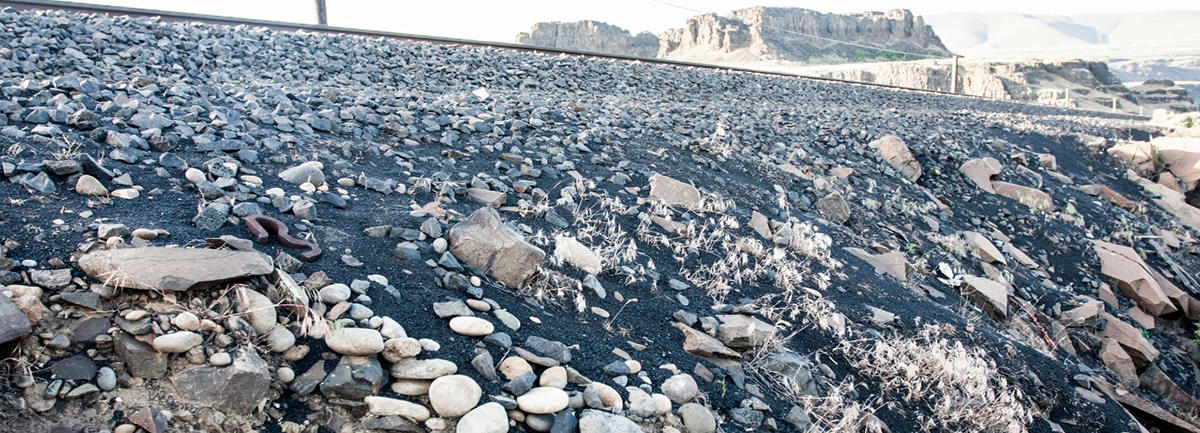For Immediate Release - June 13, 2016
Contacts
Michael Lang, Friends of the Columbia Gorge, 503-490-3979
Dr. Dan Jaffe, University of Washington - Bothell: (206) 225-8264
Public comments on the draft environmental study for the Millennium Bulk Terminal in Longview, WA show that the study underestimates the amount of coal dust pollution caused by the transport of coal by rail in open-topped coal cars. Comments on Longview DEIS (EIS) submitted by Daniel Jaffe, Professor of Atmospheric Chemistry at the University of Washington Bothell cited several deficiencies in the study's coal dust analysis, including:
- The EIS needs to clearly indicate that coal dust includes inhalable PM2.5;
- The EIS needs to address what are the causes for known failure in the surfactant coating;
- The EIS fails to describe acceptable limits of human health impacts of coal dust;
- The coal dust study was likely influenced by an inherent bias due to the fact that the shipper knew the date, time and location of the tests;
- The study underestimates coal dust by a factor of four.
Dr. Jaffe’s comments may be found in their entirely here:
http://www.atmos.washington.edu/jaffegroup/modules/APOLLO/Comments%20on%20Longview%20DEIS.pdf
Don McDermott, resident and vineyard owner in the Columbia Gorge, regularly sees coal pollution from existing coal train traffic on his property in Dallesport, WA. “The increase in train traffic from coal transport will harm our community and the Gorge environment,” said Mr. McDermott. If the Millennium Bulk Terminal is built it would be the largest coal terminal in the U.S. and would result in eight additional loaded coal trains per day through the federally protected Columbia River Gorge National Scenic Area.
Dr. Jaffe’s 2015 published report on coal dust from coal trains in the Columbia River Gorge showed that every coal train discharges coal dust, coal trains emit twice the amount of fine particulate matter (the kind that causes lung disease) as compared to other freight trains, 5.3% of coal trains emit large visible cloud of coal dust, and 10.3% emit large clouds of coal dust when combined wind speeds exceed 56 mph.
Read Dr. Jaffe’s full report:
http://www.atmos.washington.edu/jaffegroup/modules/APOLLO/Jaffe_DPM_coal_dust_trains_ColumbiaRivGorge_2015.pdf
The U.S. Surface Transportation Board has ruled that coal dust gets into the rail ballast and damages the track infrastructure and that this damage has eventually resulted in derailments. BNSF and Union Pacific carry various hazardous materials by rail through the Gorge, including Bakken crude oil. Tesoro’s proposed Vancouver Energy Terminal in Vancouver proposes to transport 15 million gallons of volatile Bakken crude oil per day in five “unit” trains through the Columbia Gorge over rail tracks littered with coal dust.
Read the Surface Transportation Board decision:
http://www.troutmansandersenergyreport.com/wp-content/uploads/2011/03/Coal-Dust.pdf
“The elephant in the room is the June 3, 2016 derailment of a Union Pacific Bakken crude oil train in Mosier Oregon in the Columbia River Gorge," said Peter Cornelison, Friends’ Field Representative and Gorge resident. "The weight of crude oil trains makes them more susceptible to derailment when rail infrastructure is weakened. The increased coal dust emissions as a result of the Millennium terminal would result in more derailments involving trains carrying Bakken crude oil.”
Friends of the Columbia Gorge has monitored coal dust for several years in the Gorge. Contrary to the findings in the draft environmental study for the Millennium terminal, coal trains continue to illegally pollute the Columbia River Gorge National Scenic Area and the Columbia River with large amounts of coal debris, even after being sprayed with a chemical surfactant at the mine and also in Pasco, WA. BNSF is actually employing vacuum trucks to remove coal dust at Columbia Hills State Park in the Gorge, but it can’t keep up with the ongoing discharge of coal into the environment.
Coal Dust Chronology in the Columbia River Gorge
“Our field monitoring shows that coal dust from existing coal train traffic continues to pollute the Columbia River Gorge despite the railroads claims otherwise," said Michael Lang, conservation Director for Friends of the Columbia Gorge. "According to Dr. Dan Jaffe’s analysis and ongoing field monitoring by Friends of the Columbia Gorge, coal transport through the Columbia Gorge by the Millennium coal terminal project would cause significant harm to the environment and human health.”
